Science on Stage: countdown to the international festival Inspire article
Science on Stage brings together many of Europe’s most innovative and inspiring science teachers. Andrew Brown reviews some of the recent national activities.
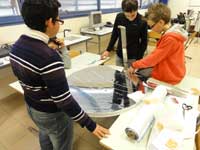
reflector
Image courtesy of Guillaume
Lebatard
Science on Stage offers a platform for European science teachers to share their teaching ideas, workshops and performances. Via national events, teachers compete for places at the Science on Stage international teaching festival, which this year will be held in Copenhagen, Denmark, on 16-19 Aprilw1. The 2011 festival, with the motto ‘Science teaching: winning hearts and minds’, will bring together 350 European science teachers.
France: Solar-powered curry and musical sunshine
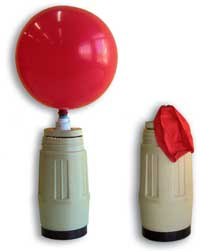
the metal bottle to which it is
attached is immersed in
liquid nitrogen
Image courtesy of Ioannis
Gatsios
The French organisers of Science on Stage, Science à l’Ecolew2, collaborated with a national science contest for middle- and high-school students called CGenial. On 15 May 2010, 81 projects were presented in Nantes and 12 teachers were selected to attend the international Science on Stage festival this year
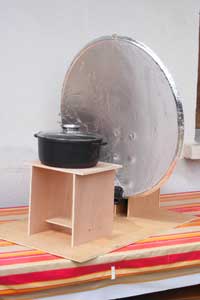
Image courtesy of Guillaume
Lebatard
Guillaume Lebatard and Amandine Sultana described how their students, aged 11-12, used little more than an old satellite dish and some aluminium foil to make a steaming hot gourmet meal. The foil was used to line the surface of the dish, creating a parabolic reflector capable of concentrating the Sun’s energy. This solar cooker proved sufficiently powerful to boil water and even to make a delicious chicken curry!
Mathematics teacher Francis Loret challenged his 14-year-old students to battle against him in the Internet’s biggest virtual sailing race, the Vendée Globew3. Students were given expert training in the basic principles of sailing and in meteorology and the interpretation of weather maps. They had to grapple with the unfamiliar concepts of spherical geometry, which underpin the calculations necessary to sail in the race. Of the 340 000 race participants, Francis’s most accomplished student sailor finished in an impressive 216th place.
Mozart, Bach, Beethoven, Rachmaninoff… and the Sun? Who would have thought that in addition to sustaining all life on Earth, the Sun also produces music? Jean-Michel Laclaverie and Elisabeth Martre’s students studied the frequency of vibrations emitted by the Sun and used them to show how this ‘music’ compares to that produced by more traditional musical instruments.
Greece: Rainbows and Mars
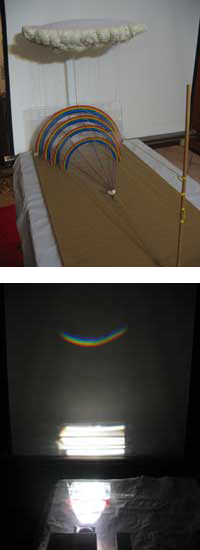
why a rainbow is bow-
shaped
Images courtesy of Elias
Kalogirou
On 15-16 October 2010, 3000 visitors – including 2000 students – flocked to the Hellenic Science on Stage eventw4 at the Laboratory Centre for Physical Sciences of Aigaleo. There, teachers and students from across Greece presented 110 high-school projects, including laboratory exhibits and two student performances.
Physics teacher Elias Kalogirou described how his students designed experiments to explain the wonders of the rainbow using their understanding of optics; why is a rainbow coloured, why is it bow-shaped and how can we create one in the classroom? (Elias has also written an article on microscale chemistry for Science in School: see Kalogirou, 2010.)
Using everyday materials, Ioannis Gatsios built 10 devices designed to teach his students about the behaviour of gases. One consisted of an inflated balloon attached to a metal bottle. When the bottle was plunged into liquid nitrogen at -190 °C, the balloon deflated, illustrating that the volume of a gas is reduced by a decrease in temperature.
Theodoros Pierratos encouraged his students to think like astronauts. He asked them to consider everything that is required to plan a trip to Mars and live on its surface. Classroom experiments helped answer questions such as: how does the solar wind affect electronic equipment, and how can we produce the energy required to maintain a manned base on Mars? (Theodoros’s work has also been featured in Science in School. See Patterson, 2009.)
Attending the international festival
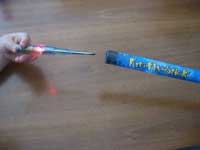
affects electronic equipment
Image courtesy of Theodoros
Pierratos
At each national Science on Stage event, a fixed number of teachers were selected to represent their country at the international Science on Stage festival in Copenhagen. For these teachers, participation will be free.
For other science teachers who wish to attend the international festival, there are a limited number of places for which a registration fee will be charged. See the Science on Stage websitew5 for details.
References
- Kalogirou E (2010) Microscale chemistry: experiments for schools. Science in School 16: 27-32. www.scienceinschool.org/2010/issue16/microscale
- Patterson L (2009) A classroom in space. Science in School 12: 50-54. www.scienceinschool.org/2009/issue12/spaceclassroom
Web References
- w1 – To find out more about Science on Stage Europe and to contact your national organisers, see: www.science-on-stage.eu
- w2 – To learn more about Science on Stage France, see: www.sciencesalecole.org
- w3 – Details of the Vendée Globe can be found here: www.vendeeglobe.org/en
- w4 – For more information about Science on Stage Greece, see: www.physics.ntua.gr/SOS-GREECE/contest.html
- w5 – To learn more about the international festival and how to apply to take part, see: http://science-on-stage.eu/?p=3
Resources
- After each of the previous international Science on Stage festivals (and the Physics on Stage festivals that preceded them), the Irish delegates produced a book describing how to carry out their favourite experiments in the festival. These books can be downloaded free of charge from the Science on Stage Ireland website: www.scienceonstage.ie/resources/





